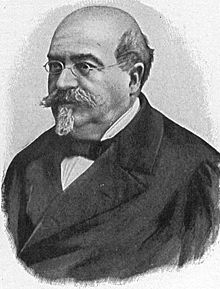Mihail Kogălniceanu
Mihail Kogălniceanu ( ; * 6 September July / 18 September 1817 greg. In Iași ; † July 1, 1891 in Paris ) was a Romanian politician , historian and publicist.
Life
Mihaeil Kogălniceanu was sent by Prince Michael Stourdza together with his two sons to Lunéville in 1834 and to Berlin in 1835 for training. He stayed in Germany until 1838 and got acquainted with the local science and education. He wrote a Histoire de la Valachie et de la Moldavie (vol. 1, Berlin 1837). Filled with liberal ideas, he returned to his homeland in 1838. With the poet Vasile Alecsandri and Constantin Negruzzi , he founded the scientific and fictional review Dacia literară in 1840 . He also contributed to the establishment of the National Theater and published the Arhiva rômanească (1840), a collection of historical documents, and under the title Letopisite three volumes of Romanian chronicles (Jassy 1845-1852; 2nd edition, Bucharest 1872).
In 1848 Kogălniceanu stood in Iași at the head of the revolt against Prince Michael Stourdza and fled to Paris ; he was able to return home the following year. He owed his political influence to the Union parties, for which he was very active. From 1855 he was the influential unionist organ Steaua Dunării . Since Alexandru Ioan Cuza was elected ruler of the united principalities of Moldova and Wallachia (January 1859), Kogălniceanu, who was absolutist and pro-Russian, took an active part in the country's political affairs. As Minister of Education, he founded the University of Alexandru Ioan Cuza Iași . On October 11th, Jul. / 23 October 1863 greg. he took over the premier presidency of Romania . He successfully introduced a law for the secularization of monastery property, which was passed on December 25, 1863 . / January 6, 1864 greg. was also adopted and entered into force. Then he helped Cuza on May 2nd jul. / May 14, 1864 greg. carry out his coup and enacted a number of laws in the field of administration, justice, education, especially the Rural Law, which abolished the indulgence against compensation. However, he reformed too hastily, he that on January 26 jul. / 7th February 1865 greg. had to resign as Prime Minister.
Under the government of Prince Karl von Hohenzollern-Sigmaringen Kogălniceanu was a member of the Chamber of Deputies and was on November 16 July. / November 28, 1868 greg. Minister of the Interior in the cabinet of Dimitrie Ghica , which until January 27th jul. / February 8, 1870 greg. duration. During the conservative cabinet of Lascăr Catargiu (1871-76) he belonged to the liberal opposition. When the Liberals came to power in 1876, Kogălniceanu took over the Foreign Ministry under Ion C. Brătianu in April 1877 and headed it until November 1878. From 1879 to 1880 he was then Minister of the Interior. However, he did not have his earlier influence. In 1880 he became the Romanian envoy in Paris, but was recalled again in 1881. An opponent of Brătianu as a zealous Russian friend, he now openly opposed him and fought his politics, which tended towards Austria and Germany, but without success, since his reputation was shaken by ambiguous financial transactions. He died in Paris on July 1, 1891, at the age of 73.
Places named after Mihail Kogălniceanu
The international airport of the Romanian city of Constanța has had his name since the 1950s, as have several localities and a military base.
literature
- Cogalniceanu, Michael , in Meyers Großes Konversations-Lexikon , 6th Edition, 1902-08, Vol. 4, p. 212.
Web links
- Mihail Kogălniceanu - biography at ohiou.edu (English)
- Mihail Kogălniceanu , at ro.biography.name (Romanian)
| personal data | |
|---|---|
| SURNAME | Kogălniceanu, Mihail |
| BRIEF DESCRIPTION | Romanian politician, historian and publicist |
| DATE OF BIRTH | September 18, 1817 |
| PLACE OF BIRTH | Iași |
| DATE OF DEATH | July 1, 1891 |
| Place of death | Paris , France |
